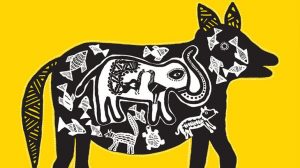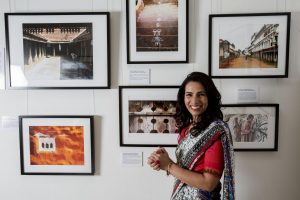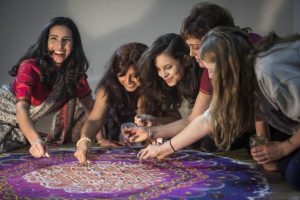Funzing - Indian Folk and Tribal Art Creative Workshop
- Central Street, London, EC1V 8AJ
- (Exact address will be provided after booking)
- Suitable for: Kids ( from age 5 to age 16 ) / Adults
Join our journey to India to learn about the world of contemporary folk and tribal art, and the colourful patterned designs that are ritually displayed on the domestic walls and floors as house decoration in rural villages and cities.
Your experience involves an artistic introduction and narrative into the traditional meaning of contemporary folk and tribal art styles in India. We will explore different regional and stylistic differences between Kolam floor decoration in South India in contrast to Warli and Madhubani artistic wall decoration in Western and Central India.
Armed with visual inspiration of this traditional art style you will then create your own ritual folk or tribal design using quality pens, pencils, paint, stencils on foam board or handcrafted paper.
All skills and ages are welcome – suitable for children, great for kids parties, families, adults, curious artists, interior designers, team building or overseas visitors to London.
Exhibition on Kolam South Indian floor art at Harrow Arts Centre 2017 and 2018
Architecture, art, music, food and stories are the essence of what forms and keeps a community together, says social anthropologist Yasmin Hales, who has launched her exhibition – Talking Streets – at the Harrow Arts Centre.
The exhibition, which focuses on the meaning and expression of Kolam South Indian floor decoration, aims to raise awareness of community heritage and cultural diversity.
Yasmin, who received various awards for her doctorate research on ‘Talking Streets: The Experience and Expression of Space and Place in Tamil Nadu’, has always had an interest in why different cultures decorate their walls and floors in different ways. Her latest work is an inter-generational community heritage project, exploring the features of tradition with particular emphasis on the daily street applications of ritual Kolam floor decorations.
Yasmin, who is continuing her research within this field as part of her Phd, says: “The exhibition is inspired by my academic research. Primarily what I am interested in is the cross-cultural meaning of human behaviour and why people do what they do. One of the things that I have noticed as I have travelled is that different people decorate their walls and floors in different ways.
“I have, over a period of several years, researched why the decorative walls and floors in different parts of India differ and what the meaning of those are and how they relate to their community.”
Yasmin explains that she has lived in India on and off for a number of years and for her research focused on a place called Pondicherry in South India.
“What I realised was that people were decorating their floors on a daily basis,” says Yasmin, who lives in central London with her teenage daughter. “The women were rising at 4am every morning – they would wash the tiles down and then decorate them with geometric patterns and circles.
“It became a form of religious identity as well as a form of gender identity.
“I asked the question what is this and why? And then began exploring different pathways.”
Through this exhibition, Yasmin, who teaches social anthropology at the University of London’s Birkbeck College, hopes to encourage South Indian women to continue this decorative tradition and inspire future generations.
“More than anything though I want to raise cultural awareness,” she says. “We live in such a fast-moving society that there seems to be a breakdown in the concept of community – it’s changing from cohesion and a form of collectivity to a concept of isolation. I don’t think people talk anymore.”
Yasmin adds, “In South India, particularly the region I have been working in, the streets are alive everyday through art and design and not only architecturally brick by brick, but they talk through patterns, movement, through conversation and the architectural layout. Whereas here it is very different.
“So I what I want to do is to raise awareness among the South Asian community of these wonderful, expressive designs that were happening in India and really saying to people – where is your heritage?”
The exhibition is complimented by a series of workshops and events, which Yasmin is keen to extend.
She says: “Hopefully the exhibition and educational workshops will also roll out to other South Indian and non-South Indian communities to raise awareness, inspire and motivate all generations to keep culture in the community alive.
“So if any South Asian women with Kolam experience, playwrights and other communities from all over the globe want to get involved in transmitting this tradition or any other cultural traditions, please do get in touch and pass it on.
“Let the streets do the talking and be the talk of the street.”
Harrow Arts Centre, Uxbridge Road, Hatch End, until February 7. Details: 020 8416 8989, talkingstreets.co.uk


